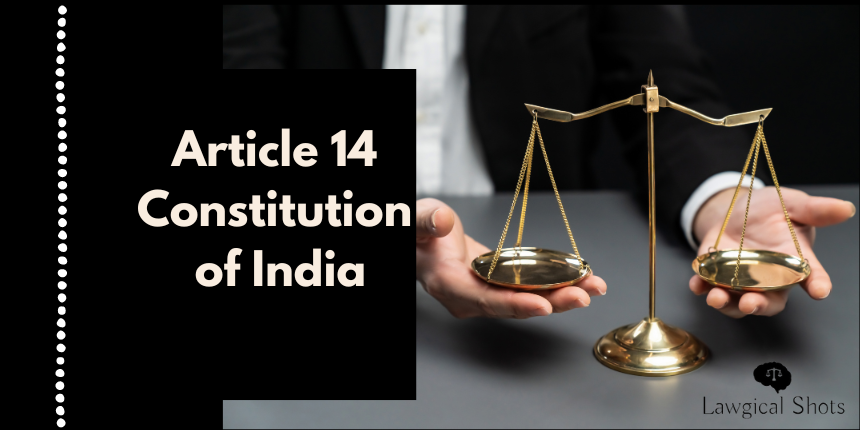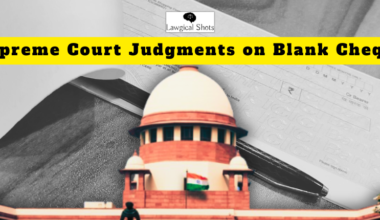When I was in school, wearing a uniform on a daily basis was a bit unpleasant. Everyone looked the same!! That pink dress on my birthday made me stand out from the rest of my schoolmates. Everyone was being treated equally in terms of uniforms or academics. It felt like we were all the same when in school, regardless of our caste, religion, we were equals.
Now imagine a world where classrooms were divided based on rich-poor, Hindu-Muslim, fair-dark, etc. Not a good place to grow, right? That’s the importance of equality. It may not be felt or cherished much when enjoyed in an uninterrupted manner. But its absence brings a different level of despair. Here, we are going to talk about the concept of equality enshrined under Article 14 of Indian Constitution, and the case laws which expand its scope.
Article 14 of the Constitution of India talks about Equality before law. The exact provision reads as:
“14. Equality Before Law – The State shall not deny to any person equality before the law or the equal protection of the laws within the territory of India.”
Article 14 Explanation
Any person
People often get confused with whom exactly Article 14 is applicable to. The answer to this question is explicitly provided in the provision itself. It targets ‘any person’. This means that a citizen of India as well as a non-citizen is a beneficiary under Article 14.
Equality before Law
In general, equality before the law means that every person will be treated equally before law. In other words, the provision restricts any discrimination in law based on their caste, creed, religion, gender or any other characteristics. So when a person of high social status is found to be accused of a charge of murder, he/she has to undergo trial just like a poor man. Such a person does not enjoy any privilege under the law. This is mostly considered as a negative right which can be protected against the State.
Equal Protection of Laws
When we talk about equal protection of laws, it targets the equals to be treated alike in similar circumstances. So a person earning lakhs on an annual basis cannot be taxed equally as that of a person only earning a lakh on an annual basis. Such persons cannot be put on an equal footing, and the State is empowered to classify to protect the interests of equals. Here, it is a positive right empowering the State at the time of policy making.
While the Article 14 of Indian Constitution itself does not mention anything about reasonable classification, arbitrariness or connection with any other Article/provision, the Courts in India have been interpreting the provisions while dealing with cases. This, in turn, has expanded the scope for right to equality under the Constitution of India’s Article 14. Some of the important landmark cases have been covered below.
Video on Fundamental Rights under Constitution of India
Interpretation of Article 14 of Indian Constitution – Case Laws
Test of Reasonable Classification
Supreme Court’s Justice Das in State of West Bengal v. Anwar Ali Sarkar Mohamed (decided on January 11, 1952) held that “Article 14 does not insist that every piece of legislation must have universal application and it does not take away from the State the power to classify persons for the purposes of legislation, but the classification must be rational, and in order to satisfy this test (i) the classification must be founded on an intelligible differentia which distinguished those that are grouped together from others,and (ii) that differentia must have a rational relation to the object sought to be achieved by the Act.”
Protection against Discrimination for Similarly Placed
The Supreme Court in Western U.P. Electric Power and Supply Co. Ltd. v. State of U.P. and Anr. (decided on March 7, 1969) stated that “Article 14 of the Constitution ensures equality among equals; its aim is to protect persons similarly placed against discriminatory treatment. It does not however operate against rational classification. A person setting up a grievance of denial of equal treatment by law must establish that between persons similarly circumstanced, some were treated to their prejudice and the differential treatment had no reasonable relation to the object sought to be achieved by the law.“
Equality v. Arbitrariness
In the case of EP Royappa v. State Of Tamil Nadu & Another (decided on November 23, 1973), the Supreme Court discussed arbitrariness and equality under Article 14 of Indian Constitution. The Court expressed that “Equality is a dynamic concept with many aspects and dimensions and it cannot be ‘cribbed cabined and confined’ within traditional and doctrinaire limits. From a positivistic point of view, equality is antithetic to arbitrariness. In fact equality and arbitrariness are sworn enemies; one belongs to the rule of law in a republic while the other, to the whim and caprice of an absolute monarch. Where an act is arbitrary it is implicit in it that it is unequal both according to political logic and constitutional law and is therefore violative of Art. 14, and if it affects any matter relating to public employment, it is also violative of Art. 16.”
Article 14 of Indian Constitution – Right to Equality
In Maneka Gandhi v. Union of India (decided on January 25, 1978), the Supreme Court was dealing with the legality of impounding of passport by the State and the interplay between Articles 14, 19 and 21 of the Constitution of India. The Bench clarified that “ Articles 14 to 18 occur under the heading ‘Right to, Equality’, and of them, by far the most important is Article 14 which confers a fundamental right by injuncting the State not to ‘deny to any person equality before the law or the equal protection of the laws within the territory of India’.”
Not fanciful but elementary rights
The Supreme Court in Minerva Mills & Others v. Union of India & Others (decided on July 31, 1980), observed that Articles 14 and 19 do not confer any fanciful rights. They confer rights which are elementary for the proper and effective functioning of democracy, which are universally regarded by the Universal Declaration of Human Rights. That if Articles 14 and 19 are put out of operation, Article 32 will be rendered nugatory.
Article 14 strikes against arbitrariness
The Apex Court in Ajay Hasia v. Khalid Mujib Sehravardi (decided on November 13,1980) expressed that “Article 14 must not be identified with the doctrine of classification. What Article 14 strikes at is arbitrariness because any action that is arbitrary, must necessarily involve negation of equality. The doctrine of classification which is evolved by the courts is not paraphrase of Article 14 nor is it the objective and end of that Article. It is merely a judicial formula for determining whether the legislative or executive action in question is arbitrary and therefore constituting denial of equality.”
Article 14 and Article 16(1)
In case of Indra Sawhney v. Union Of India and Others (decided on November 16, 1992), the Apex Court clarified that “Principle of Article 14 of reasonable classification may be relevant only to limited extent as to whether it is backed by reason and is justified but since it has to be tested further on touchstone on Article 16(1) the reasonable classification must be so tailored as not to contravene the right to equal opportunity.”
Inference
Here, we take this opportunity to thank the makers of the Indian Constitution who felt the importance of rule of law and included the provision which empowers the people and thereby strengthens democracy. In addition, the Courts in India are equally deserving for expanding the scope of Article 14 of Indian Constitution for better.








